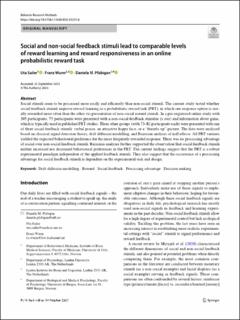| dc.contributor.author | Sailer, Uta | |
| dc.contributor.author | Wurm, Franz | |
| dc.contributor.author | Pfabigan, Daniela M. | |
| dc.date.accessioned | 2023-12-21T14:28:40Z | |
| dc.date.available | 2023-12-21T14:28:40Z | |
| dc.date.created | 2023-10-18T16:08:07Z | |
| dc.date.issued | 2023 | |
| dc.identifier.issn | 1554-351X | |
| dc.identifier.uri | https://hdl.handle.net/11250/3108678 | |
| dc.description.abstract | Social stimuli seem to be processed more easily and efficiently than non-social stimuli. The current study tested whether social feedback stimuli improve reward learning in a probabilistic reward task (PRT), in which one response option is usually rewarded more often than the other via presentation of non-social reward stimuli. In a pre-registered online study with 305 participants, 75 participants were presented with a non-social feedback stimulus (a star) and information about gains, which is typically used in published PRT studies. Three other groups (with 73–82 participants each) were presented with one of three social feedback stimuli: verbal praise, an attractive happy face, or a “thumbs up”-picture. The data were analysed based on classical signal detection theory, drift diffusion modelling, and Bayesian analyses of null effects. All PRT variants yielded the expected behavioural preference for the more frequently rewarded response. There was no processing advantage of social over non-social feedback stimuli. Bayesian analyses further supported the observation that social feedback stimuli neither increased nor decreased behavioural preferences in the PRT. The current findings suggest that the PRT is a robust experimental paradigm independent of the applied feedback stimuli. They also suggest that the occurrence of a processing advantage for social feedback stimuli is dependent on the experimental task and design. | en_US |
| dc.language.iso | eng | en_US |
| dc.publisher | Springer | en_US |
| dc.rights | Navngivelse 4.0 Internasjonal | * |
| dc.rights.uri | http://creativecommons.org/licenses/by/4.0/deed.no | * |
| dc.title | Social and non-social feedback stimuli lead to comparable levels of reward learning and reward responsiveness in an online probabilistic reward task | en_US |
| dc.type | Journal article | en_US |
| dc.type | Peer reviewed | en_US |
| dc.description.version | publishedVersion | en_US |
| dc.rights.holder | Copyright 2023 The Author(s) | en_US |
| cristin.ispublished | true | |
| cristin.fulltext | original | |
| cristin.qualitycode | 2 | |
| dc.identifier.doi | 10.3758/s13428-023-02255-6 | |
| dc.identifier.cristin | 2186008 | |
| dc.source.journal | Behavior Research Methods | en_US |
| dc.identifier.citation | Behavior Research Methods. 2023 | en_US |

